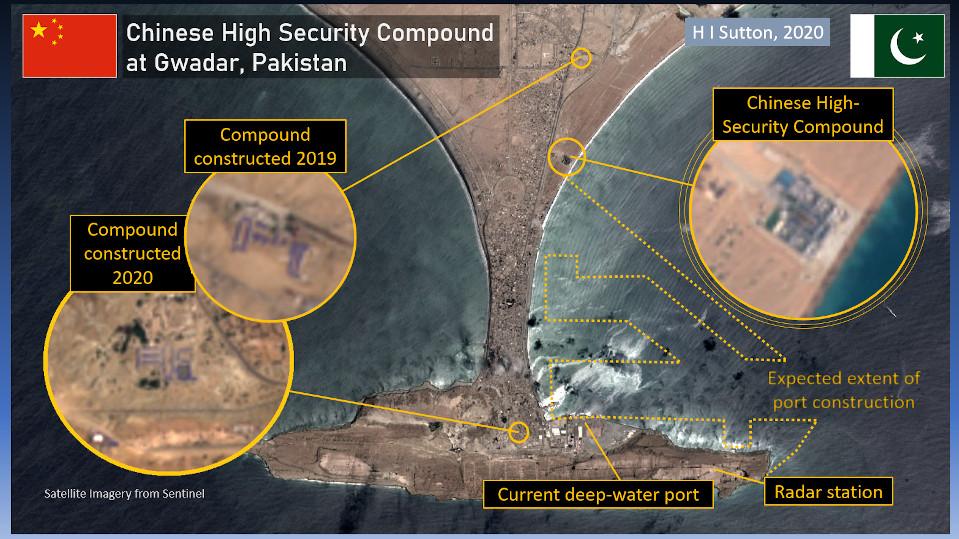China’s New High-Security Compound In Pakistan May Indicate Naval Plans

by H I Sutton
Analysts have been watching for the first signs of a long-expected Chinese naval base at Gwadar in Pakistan. The base, to complement an elaborate one in Djibouti, would strengthen China’s foothold in the Indian Ocean. Recent satellite images appear to show that several new complexes have been built in the last few years. One of them, identified as being used by a Chinese company involved in port development, has unusually high security.
Located at the western end of Pakistan’s coast, Gwadar is expected to be a major port in China’s Belt and Road Initiative. This will allow Chinese goods to shortcut through Pakistan, instead of sailing all the way around South Asia. China was first reported to be planning a naval base there in January 2018. While the plan has never been confirmed officially, it would be a natural path.

The high-security compound has been identified as being used by the China Communications Construction Company (CCCC Ltd). This is a majority state-owned company that is heavily involved in many Chinese civil engineering projects. While some degree of security is normal in the region, the level of security seen here is extensive.
It has anti-vehicle berms, security fences and a high wall. Sentry posts and elevated guard towers cover the perimeter between the fence and the inner wall. This suggests armed guards with rifles.

The compound has several layers of defence, including raised sentry posts
China has good reason to focus on security. The region, near the border with Iran and Afghanistan, is facing a long-standing insurgency. The Baluchistan Liberation Army (BLA) seeks an independent state for the Baloch people. They carried out an attack on the Chinese Consulate in Karachi on November 23 2018, and on a hotel in Gwadar on May 11 2019. The latter attack targeted the Zaver Pearl-Continental 5-star Hotel, which is another centrepiece of Chinese investment in the town.
THREAD - 1. #Civil_Engineering From Space - The 19 km Gwadar East Bay Expressway in #Pakistan. Under the China–Pakistan Economic Corridor (CPEC), the 6 lanes road will connect N10 National Highway (Makran Coastal Highway) with Gwadar Free Zone and Gwadar Port. #CIVINT pic.twitter.com/meLYzRWkAp— CIVINT (@Civil_Int) June 1, 2020
The high security compound is not alone. There are also two smaller sites built in the last year with rows of blue-roofed buildings. It has been suggested that these might be barracks for a Chinese Marine Corps garrison. China was reported to be deploying marines there back in March 2017. But the sites lack the level of security that would be expected. Whatever their exact purpose, their location and timing suggests that they are connected to the port expansion. The sites can be seen in these tweets by Twitter user @Civil_Int:
Until now the commercial port at Gwadar appears to have been under-used. But Gwadar’s luck as a port is already changing, and not because of the Chinese base. A deal was recently made to allow Afghanistan-bound trade to use the port. The first large merchant ship, the MV Manet, landed 17,600 tons of wheat there last week. But the economic benefit of the Chinese port and potential naval base could be much larger.
Whether the Chinese naval base materialises remains to be seen. But these new sites, including the heavily defended compound, may indicate that the next phase of port construction is imminent. And if the Chinese Navy does begin using the port it will strengthen their capabilities in the Indian Ocean.



No comments:
Post a Comment